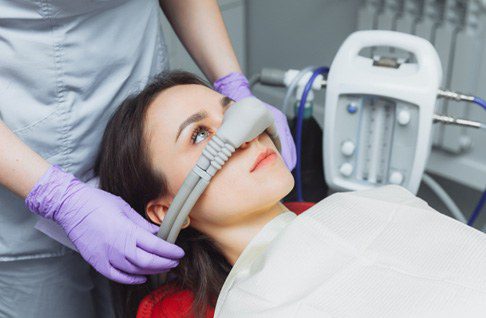SEDATION DENTISTRY – FORT WORTH, TX
Feel At-Ease When You Visit the Dentist
Do you experience overstimulation, anxiety, or nervousness whenever you visit the dentist? Instead of making yourself endure hours of an overwhelming experience, we want you to be able to relax and enjoy your time with us. Our kind and understanding team offers three types of sedation to make your treatment more comfortable, including nitrous oxide, oral conscious, and IV sedation dentistry in our Fort Worth, TX dental office. To learn more, read below or call our dental office!
Why Choose Hulen Crossing Family Dental for Sedation Dentistry?

Fast Acting
Laughing Gas

Compassionate
Dental Team

Passionate & Skilled
Dentist
Oral Conscious Sedation
WHAT IS ORAL CONSCIOUS SEDATION?
HOW DOES ORAL CONSCIOUS SEDATION WORK?
If we prescribe oral conscious sedation for you, we’ll require that someone drive you to and from your appointment. While you’re in the examination chair, you should feel calm and groggy. You’ll remain conscious throughout your entire treatment, at least enough to answer simple questions and respond to basic instructions. However, you’ll be completely oblivious to all the sensations that would typically cause you anxiety or discomfort. Our team will carefully monitor you the entire time to ensure you are as safe and comfortable as possible. In many cases, oral conscious sedation helps us complete treatments faster!
Afterward, you’ll still feel very relaxed. Plus, thanks to the amnesiac effects of the medication, you’ll likely only have a few hazy memories of the experience. It will take time for the feeling of sedation to wear off, but you should begin to feel back to normal later that evening, or the next morning at the latest.
ARE YOU A GOOD CANDIDATE FOR ORAL CONSCIOUS SEDATION?
Have moderate anxiety or fear about visiting the dentist
Tend to cancel upcoming appointments out of fear
Have very sensitive teeth or an overactive gag reflex
Don’t respond to local anesthetic very well
Will be undergoing a complex treatment
Will be having several treatments completed in one appointment


Nitrous Oxide Sedation
WHO IS A GOOD CANDIDATE FOR NITROUS OXIDE?
Suffer from mild to moderate dental-related anxiety
Don’t like the sights, smells, or sounds of the dental office
Have a strong gag reflex or dental sensitivity
Don’t respond well to typical anesthetics
Are afraid of needles (such as anesthetic injections)
Have trouble remaining seated for longer periods of time
HOW DOES NITROUS OXIDE WORK?
AFTERCARE FOR NITROUS OXIDE
IV Sedation
WHAT IS IV SEDATION?
This form of sedation dentistry is given intravenously, meaning it’s administered via the bloodstream. By doing so, the effects of the sedative can begin to work much more quickly than other methods of sedation, as most patients end up becoming extremely relaxed within a matter of moments. Unlike nitrous oxide, where the patient is wide awake during their treatment, IV sedation places the person in a state of deeper relaxation.
Many people claim they feel as though they fell asleep during their appointment, even though they’re technically still conscious. The effects can last many hours after the procedure is over, so you’ll have to arrange for someone to drive you to and from your dental visit if you’re going to undergo IV sedation.
WHO IS A GOOD CANDIDATE FOR IV SEDATION?
In many cases, IV sedation is used for those who are preparing to undergo extensive treatments or require oral surgery. This form of dentistry is effective at helping patients reduce their dental-related anxieties or fears about visiting their dentist. Additionally, people who have neuromuscular problems, TMJ disorders, or an overactive gag reflex that can make keeping their mouth open challenging tend to benefit greatly from IV sedation.
Our team will take a look at your situation and evaluate your level of anxiety (plus your medical/dental history and any medications that you’re taking) to see if this form of dentistry will be a good option for you. We’ll also walk you through the process and discuss the price of your additional treatment so you know what to expect.
THE BENEFITS OF IV SEDATION
Effects kick in quickly due to the sedative being administered into the bloodstream
Provides a deeper state of calmness to significantly reduce anxiety.
Offers an effective method for patients with dental phobia to undergo essential oral healthcare
A qualified dental team will monitor the flow of the sedative to ensure you’re safe and relaxed throughout your appointment


Reasons to Consider Sedation Dentistry
Extreme dental fear or anxiety
Previously traumatic dental experiences
Difficulty or inability to get numb
A sensitive gag reflex
Complex or extensive dental problems
Restlessness during lengthy dental appointments
Phobia related to needles or shots
Negative response to dental office noises, smells, or tastes
TMJ-problems or discomfort when keeping the mouth open for extended periods of time
Sedation Dentistry FAQs
CAN I RECEIVE DENTAL SEDATION WHILE PREGNANT?
WILL I REMEMBER ANYTHING IF I GET DENTAL SEDATION?
ARE THERE ANY RISKS TO SEDATION DENTISTRY?
WILL MY INSURANCE COVER DENTAL SEDATION?
HOW LONG DOES SEDATION LAST?


